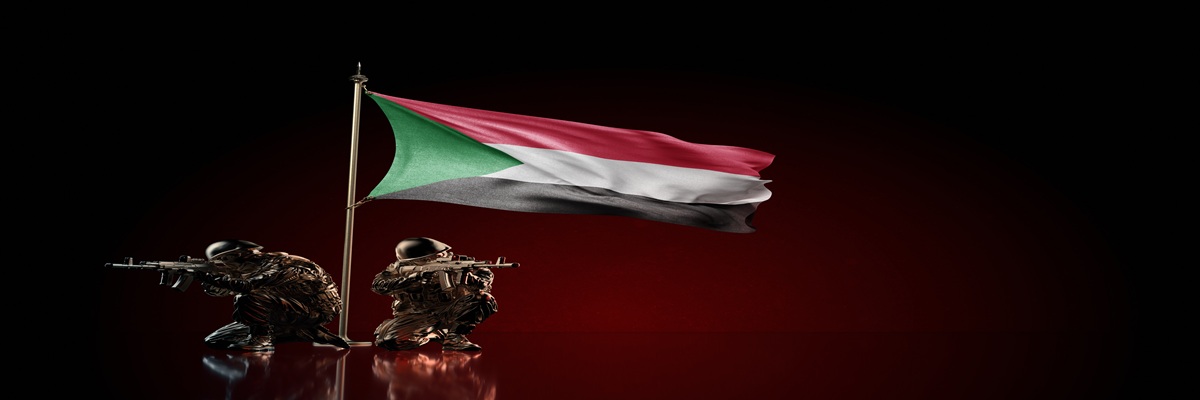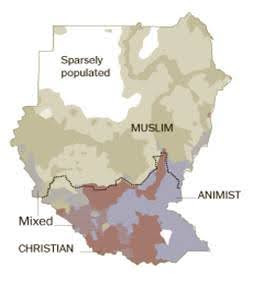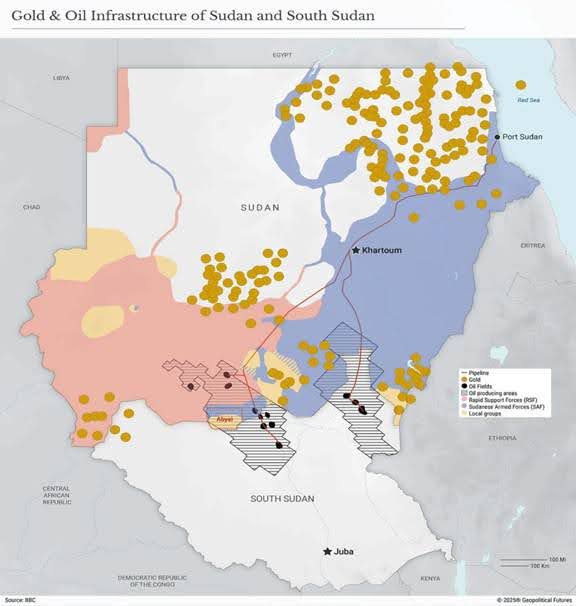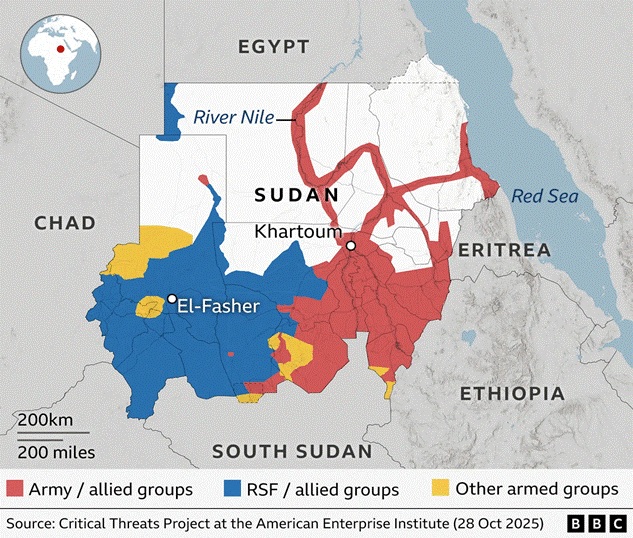Defense & Security
Brief History of Modern Sudan: A Nation Plagued by Power Struggles, Ethnic Violence and Civil War

Image Source : Shutterstock
Subscribe to our weekly newsletters for free
If you want to subscribe to World & New World Newsletter, please enter
your e-mail
Defense & Security

Image Source : Shutterstock
First Published in: Dec.01,2025
Nov.28, 2025
When we hear the word Pyramids, the first country to come to our mind is mostly Egypt and its marvelous Pyramids of Giza. But there is one country down south known as Sudan which has significantly more pyramids when compared to Egypt, albeit smaller in size compared to Egyptian pyramids. This country is marred with power struggles, civil war and genocide because of multiple reasons including geographic, social, historical and economic reasons. Since April 2023, the country has been going through its brutal third civil war.
Origin of Modern Sudan
The history of modern Sudan can be traced back to the beginning of the 19th century. In the year 1820, the Governor of Ottoman-Egypt Muhammad Ali-Pasha sent his army to conquer Sudan and from 1821–1885 it was ruled by the Ottoman-Egyptian rulers. In 1881, Muhammad Ahmad launched a revolt against the Egyptians and established the Mahdist State, which ruled Sudan between 1885–1899. Later, when the British conquered Egypt during the Scramble for Africa, they also conquered Sudan and both countries came under British jurisdiction. Sudan got independence from the British in 1956 after several anti-colonial movements.
North–South Civil War
Sudan has till now fought two civil wars and is currently fighting its third civil war. The seeds of the first and second civil wars can be traced back to British colonial rule of Sudan. When the British took control over Sudan, they found that the northern and southern regions of Sudan were culturally diverse. Their so-called aim was to preserve the southern culture from the north, and they developed certain policies collectively referred to as the British Southern Policy. Under these policies, the southern provinces (Upper Nile, Equatoria and Bahr al-Ghazal) were closed off to northerners, except for those on government business. Greek, Syrian and Jewish traders were encouraged to open businesses in the south. The Arabic language, lifestyle and even names were discouraged. Christian missionaries were encouraged while at the same time Muslim proselytizing was banned.

Source: New York Times
The result of these policies wasn’t good; the southerners lagged behind northerners in every aspect from education to economic development. Northerners tended to view southerners as backward and uncivilized. In 1946, the British reversed their policy and began to reintegrate the south with the north. By this time, anti-colonial movements had taken a strong hold in the north and were asking for British withdrawal. Negotiations for the transition to independence largely bypassed the south. Mistrust in the northern government increased when, in 1954, the newly elected transitional government, dominated by the north, began the process of “Sudanization” of government institutions. A total of 800 posts were vacated by the British but only six went to southerners. Although the root cause was that the southerners to some extent lacked the required qualifications to fill these posts — and it was because of the British Southern Policy — the southerners viewed this as domination and discrimination by the north.
Tensions were already high, but they escalated in 1955, just prior to Sudan's declaration of independence. Southern soldiers in the Sudanese army stationed in Torit mutinied against their northern commanders. The immediate cause was the transfer of these southern units to the north, which was seen as a move towards further domination and suppression by the northern government. Although the Torit mutiny was quickly suppressed, it sparked widespread unrest across the south. All hell broke loose in 1958 when the elected government of Sudan was overthrown by Brigadier General Ibrahim Abboud. It was under his regime that the tense situation in the south blew into an outright civil war. It was an assumption in the north that the North–South problem could be solved by assimilating the southerners, who were predominantly non-Arab Christians and animists, with Arab-Islamic influence in the north. Abboud, being a dictator, took it to the extreme: he banned Sunday holidays in the south, prohibited religious gathering outside churches, expelled missionaries from the south, and eventually the situation became dire. He was overthrown in 1964 and civilian rule returned to Sudan, but it didn’t last long, and in 1969 there was a coup by Gaafar Muhammad al-Nimeiri and he became the new dictator. By the time the armed conflict ended in stalemate in 1972, anywhere from 500,000 to 1 million people had been killed. The Addis Ababa Agreement brought an end to the conflict; this treaty established the Southern Sudan Autonomous Region, which gave southerners some degree of autonomy.
The Addis Ababa Agreement couldn't bring lasting peace and within a decade of signing the agreement a second civil war broke out and oil played a crucial role in it. Oil was discovered in Sudan in 1959, but the north had negligible amounts of oil; most oil fields were in the south. Al-Nimeiri wanted to take control of those fields. In order to achieve this objective, he used certain tactics. In January 1982, Nimeiri announced that a referendum would be held in the south on the decentralization issue, but only in Equatoria Province. Some southern politicians immediately viewed this plan as an effort to divide the south and claimed that the plan was contrary to the 1972 autonomy agreement. These politicians were arrested on charges of forming an illegal political organization. In response to this, the separatist group Anya-nya II started attacking police stations and army barracks. There was also the Bor Mutiny in which the southern soldiers refused to leave and move to the northern garrison as part of the government’s rotating policy. These southerners threatened to fire against the newly arrived northern soldiers.
On September 8, 1983, sharia, or Islamic law, went into effect in Sudan. The penal code was amended to conform to the precepts of the Qur՚ān. Some offenses, such as theft, were punished by amputation, while alcohol and gambling were prohibited. The south, with its varied religious traditions, strongly opposed the Islamization of Sudan. However, with two-thirds of Sudan’s land and population in Arab-Muslim possession, the north controlled the country. In 1984, Nimeiri proclaimed a state of emergency because of increasing rebel attacks from different rebel groups as these attacks were threatening his regime. His policies had negative impacts on Sudan, and, in 1985, he was ousted from power by General Abdel Rahman Swar al-Dahab in a bloodless coup.
Later on, General Abdel Rahman relinquished his power and gave it to the democratically elected government of Prime Minister Sadiq al-Mahdi. In May 1986, the new Khartoum government led by Prime Minister Sadiq al-Mahdi and the Sudan People’s Liberation Army (SPLA) led by Col. John Garang met for negotiations to end the conflicts. In February 1989, a peace plan was approved by the al-Mahdi government, but later in that year Omar Hassan Ahmad al-Bashir came to power by overthrowing Prime Minister Sadiq al-Mahdi. Al-Bashir’s regime dissolved the parliament and banned political parties. The SPLA, initially seeking a unified “New Sudan” with secular governance, later shifted toward secession mostly because of al-Bashir’s policy. The second war lasted until 2005, marking it infamously as the longest civil war in modern history. A 2005 peace agreement ended the conflict and the 2011 referendum ultimately led to South Sudan's independence. It is estimated that 1 to 2.5 million lives were lost during Sudan’s second civil war.
While both the Civil wars were fought on the North-South Muslim-Christian divide, there were also numerous ethnic groups who were caught during these wars. In South Sudan, communities such as Dinka, Nuer, Shilluk and Bari held their own grievances rooted in exclusion, land and resources. In the North, groups like Fur, Masalit and Zaghawa in the Darfur region; the Nuba people in South Kordofan and the Beja in the East have their own patterns of neglect. Even though religion played an important role, but we can't rule out the importance of ethnicity in these brutal conflicts.

Source: BBC & Instagram/Geopolitical Futures
The Darfur Genocide — A Dark Chapter in Sudan's History
Darfur is a province in the western part of Sudan. During the second civil war, Darfuri rebels launched attacks on Sudanese government military targets. The Sudanese government assumed that Black African people- Fur, Maselit and Zaghawa in Darfur had supported these rebels and they reacted by arming militias — the Janjaweed — to attack those same innocent people.
The Janjaweed militias were brutal; they used “scorched earth” tactics to target those Black people. The results were catastrophic: thousands of people were murdered, and millions were forced to flee their homes. When refugees from Darfur were interviewed, they said that after government air raids on villages, the Janjaweed used to attack their village, slaughter men, rape women and steal whatever they found.
In July 2004, the US Congress declared atrocities in Darfur to be genocide and in July 2010, the International Criminal Court (ICC) issued indictments against then President al-Bashir. In 2014, these same Janjaweed militias were incorporated into the paramilitary forces known as the Rapid Support Forces. It is estimated approximately 200,000 people were killed and more than 2 million displaced during the Darfur Genocide.
Third Civil War
Omar al-Bashir ruled as dictator of Sudan up until 2019, when he was overthrown by a coup jointly organized by the Rapid Support Forces (RSF) and the Sudanese Armed Forces (SAF). RSF is the most powerful paramilitary group formed during Bashir's regime. The roots of RSF can be traced back to the Janjaweed militia which committed the heinous Darfur genocide. With support from Bashir, RSF was organized and it was employed as border security guard, mercenaries to fight wars in Yemen, to suppress any civil protest or rebellion rising against him, and most importantly it acted as a counterweight to SAF. Bashir was a dictator and a military officer; he knew that his regime was also threatened by a military coup.
In 2019, there were civilian protests against the dictatorial regime of al-Bashir. Contrary to al-Bashir’s belief, RSF didn't protect him and with SAF organized a coup and overthrew his government. They established a transitional government and a new constitution. SAF’s General Abdel Fattah al-Burhan led the transitional government while RSF’s General Mohamed Hamdan Dagalo, better known as “Hemedti”, was appointed as Deputy. Abdalla Hamdok, an economist and development expert, was chosen as Prime Minister. Hamdok tried to fix Sudan's problems, but al-Burhan and Hemedti orchestrated a coup against him in October 2021. But there were protests, the IMF and World Bank paused funding, so Hamdok was reinstated back in power in November 2021. But it was short-lived; he resigned again in February 2022 because the terms of reinstating were predatory for civilian leaders. With his resignation, Burhan and Hemedti, two strongman leaders, were left to transit Sudan into a democratic nation.
Negotiations culminated in a December 2022 deal; it laid the groundwork for a two-year transition to civilian leadership and national elections. There were protests because of the timeline and it was brutally cracked down as you expect from a strongman. A major sticking point emerged: there was a proposition in the deal that RSF would be incorporated into SAF. The suspicions were that both generals wanted to hang on to their positions of power, unwilling to lose wealth and influence. As months passed, the power struggle between both of them increased and it stalled the country's transition efforts. On April 15, 2023, everything went loose as a series of explosions shook Khartoum, along with heavy gunfire. SAF and RSF leadership accused each other of firing first. The involvement of foreign powers in this conflict has worsened the situation. It is believed that RSF has strong backing of UAE and Libyan strongman General Khalifa Haftar, while SAF has strong backing of Egypt and to some extent Iran. RSF controls almost the western half of Sudan including the Darfur region and controls the gold mines of the region. This gold is allegedly smuggled into the UAE and sold throughout the world. SAF controls most of the north and east part of Sudan including Sudan's capital Khartoum.
Several NGOs, including Human Rights Watch, have documented evidence of numerous mass atrocities committed throughout the conflict prompting accusations of ethnic cleansing and war crimes. Humanitarian access remains a crucial concern for many international actors, including the United States, which called on the UN Security Council to authorize aid deliveries through Chad. The situation has been grim since war broke out. As of November 2025, nearly twelve million people have been forcibly displaced, according to the UN refugee agency. More than 7.2 million of them are internally displaced within Sudan, while over 4.2 million are refugees, asylum seekers or “returnees” who have fled or returned to neighboring countries. The number of people killed in the conflict is unknown due to restricted media access, but researchers’ estimates vary between 20,000 and 150,000 fatalities.
In early November 2025, the RSF announced it had agreed to a humanitarian truce proposed by the US, the United Arab Emirates (UAE), Saudi Arabia and Egypt. However, the army said it would be wary of agreeing to a truce, accusing the RSF of not respecting ceasefires. UN health chief Tedros Adhanom Ghebreyesus has also lamented that there is less global interest in the conflict in Sudan, and other recent conflicts in Africa, compared to crises elsewhere in the world. As of late November 2025, both parties are still waging war and millions of innocent Sudanese are suffering.

Conclusion
Sudan as a nation-state was a colonial product; its leaders couldn't build stable institutions; they weren't able to properly define the idea of Sudanese nationalism. All of these led to power struggles, political instability, civil war and the fracturing of the nation into two parts. They could learn from countries of Asia; they were once colonies of European powers. Many of them were able to address the same problems which Sudanese politicians couldn’t. Those countries defined the idea of nationalism, built strong institutions and in turn it brought political stability and economic prosperity. Lasting peace can only happen in Sudan once stable institutions are formed; until then, Sudan will be stuck in this vicious cycle.
BBC News. Sudan conflict explainer. https://www.bbc.com/news/articles/cjel2nn22z9o BlackPast.org. First Sudanese Civil War (1955–1972). https://blackpast.org/global-african-history/first-sudanese-civil-war-1955-1972/ BlackPast.org. Second Sudanese Civil War (1983–2005). https://blackpast.org/global-african-history/second-sudanese-civil-war-1983-2005/ Council on Foreign Relations. Power struggle in Sudan: Global Conflict Tracker. https://www.cfr.org/global-conflict-tracker/conflict/power-struggle-sudan Council on Foreign Relations. To what extent is Sudan’s humanitarian crisis escalating? https://www.cfr.org/in-brief/what-extent-sudans-humanitarian-crisis EBSCO Research Starters. First Sudanese Civil War erupts. https://www.ebsco.com/research-starters/history/first-sudanese-civil-war-erupts EBSCO Research Starters. Sudanese Civil War resumes. https://www.ebsco.com/research-starters/history/sudanese-civil-war-resumes Holocaust Memorial Day Trust. Darfur genocide. https://hmd.org.uk/learn-about-the-holocaust-and-genocides/darfur/genocide/ World History Edu. Major facts about the Second Sudanese Civil War. https://worldhistoryedu.com/history-major-facts-about-the-second-sudanese-civil-war-1983-2005/ World History Edu. History of the First Sudanese War: How and when did it erupt? https://worldhistoryedu.com/history-of-first-sudanese-war-how-and-when-did-it-erupt/
First published in :
World & New World Journal

Dr. Darshit Thakar is currently pursuing higher education in the field of Medicine. His academic and intellectual interests are not limited to field of Healthcare but extend to International relations, Economics, Philosophy, Mythology, Polity and History. He writes in local newspaper where he provides analytical columns on global affairs, healthcare policy and social development. His work reflects a multidisciplinary approach that integrates knowledge of different disciplines.
Unlock articles by signing up or logging in.
Become a member for unrestricted reading!